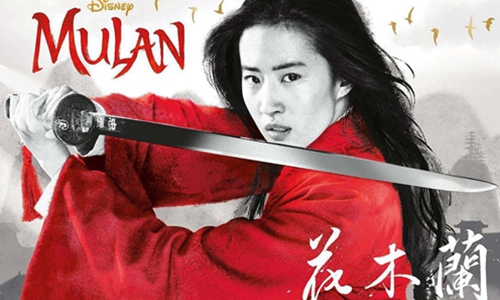Why Western media make malice toward China
By Xu Yelu Source: Global Times Published: 2020/9/11 10:22:45

Poster of Mulan Photo: Maoyan
On Tuesday, The New York Times published an article criticizing Mulan, the Disney movie telling a Chinese traditional story, for being partly filmed in Northwest China's Xinjiang Uygur Autonomous Region. In this article, the film was described as a promotional tool of the Communist Party of China (CPC)'s nationalism and ethnic Han chauvinism.How did a Hollywood movie get labeled as a political tool of China when it has nothing to do with the CPC? It seems that the Western media has a strong bias, if not open malice, when reporting news and stories about China.
The seemingly "objective" Western media actually serve the interests of their political parties and national interests. The US media, for example, frequently attack and defame China amid escalating China-US tensions. Cracking down on China has become the consensus of the Democratic and Republican parties. To media outlets, this means a political correctness in attacking China.
Reports of Western media concerning the Hong Kong Special Administrative Region, Xinjiang and the South China Sea all seem to be cast in the same light. Western interest groups appear to be coordinated by a certain propaganda machine - which is the joint interests of the West. One can hardly see any difference of opinion regarding China in the mainstream US press.
As tensions escalate between China and the US, Western journalists, as a part of the elite, refuse to recognize the advantages of the Chinese system. The West has gained an edge economically and militarily. It seized more voices on the international stage in the past. In the face of the rise of China and the multi-polarization of the world, they refuse to objectively learn about China's progress and achievements. In other words, Western media look at China through biased lenses.
Western media have used terms such as "prison" and "concentration camp" to slander China in stories describing Xinjiang. However, they totally ignore that China's governance of Xinjiang has actually brought peace and prosperity back to the region. While the virus is still raging in the US, the opening-up of Xinjiang after only 45 days of health lockdown is a strong illustration of what constitutes effective governance. It also fully exposes the Western media's malice toward China's policies in the region.
The "Black Lives Matter (BLM)" movement has sparked protests and even violence in many states in the US. However, Western media have reported on these riots with completely different position than that they took about the upheavals in Hong Kong last year. While the street violence in Hong Kong is described as fighting for democracy against authority, the BLM was seen as mobs disrupting public order. Reuters had even won the 2020 Pulitzer Prize in Breaking News Photography for its Hong Kong coverage. Western media's influence in China is waning due to its ideology-oriented style.
The rapid development of China and the intensification of tensions between China and the US make the West anxious. China is now the biggest contributor to world economic growth.
Yet arrogant Western journalists still live with a sense of superiority. They know very little about China and Chinese culture, but they want to boss China's affairs around. These so-called elites are using their narrow-mindedness and shallowness to defile China.
Western media are shackled by political correctness, but they often use freedom of speech as a cover for their true political purposes. China's image in Western media has been negative, and it is impossible for them to view China's development and progress objectively.
Although China is an important driver of the world economy in recent decades, the distorted coverage of China has actually prevented Western countries from learning from China's development experience. They now sit on their laurels and have no desire to improve.
For a long time, though, the malicious interpretation of China's image has affected not only the world's perception of China, but also the self-consciousness of contemporary China. However, this impact is waning. With the efforts of several generations, an open and enterprising China through peaceful development has increasingly won respect and support of the international community. And distorted reporting under the double standards of the Western media will eventually lose every ounce of their credit.
The author is a reporter with the Global Times. xuyelu@globaltimes.com.cn
Posted in: VIEWPOINT